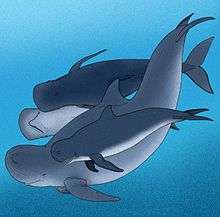Blunt-snouted dolphin
The blunt-snouted dolphin (Platalearostrum hoekmani, "Albert Hoekman's spoon-rostrum") is a prehistoric pilot whale known from a single specimen (NMR-9991-00005362), consisting of a partial rostrum, partial maxilla, partial premaxilla, and partial vomer. The fossil was discovered by Albert Hoekman on board a fishing trawler in the North Sea in 2008 and described in 2010 by Klaas Post and Erwin J.O. Kompanje. The blunt-snouted dolphin is believed to have had a balloonlike structure atop its rostrum and is estimated to have lived during the middle Pliocene to early Pleistocene.[1]
| Blunt-snouted dolphin | |
|---|---|
 | |
| Artist's reconstruction | |
| Scientific classification | |
| Kingdom: | Animalia |
| Phylum: | Chordata |
| Class: | Mammalia |
| Order: | Artiodactyla |
| Infraorder: | Cetacea |
| Family: | Delphinidae |
| Subfamily: | Orcininae |
| Genus: | †Platalearostrum |
| Species: | †P. hoekmani |
| Binomial name | |
| †Platalearostrum hoekmani Post & Kompanje, 2010 | |
Model head
References
- Klaas Post & Erwin J.O. Kompanje (2010). "A new dolphin (Cetacea, Delphinidae) from the Plio-Pleistocene of the North Sea". Deinsea. 14: 1–13. ISSN 0923-9308. Archived from the original on 2011-07-16. Retrieved 2010-11-22.
This article is issued from Wikipedia. The text is licensed under Creative Commons - Attribution - Sharealike. Additional terms may apply for the media files.